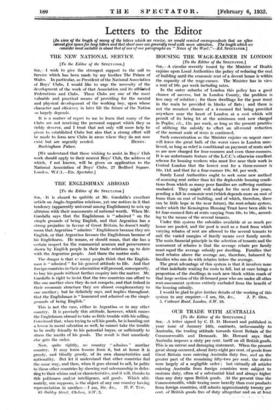THE ENGLISHMAN ABROAD
[To the Editor of the Srsersron.1
Sin, --It is absurd to quibble at Mr. Guedalla's excellent article on Anglo-Argentine relations, yet one notices in it that tendency (apparently universal among Englishmen) to mix up altruism with their assessments of national worth. When Mr. Guedalla says that the Englishman is " admired " on the simple grounds of being English, and that Argentina has a strong prejudice in favour of Great Britain, he doesn't really mean that Argentina " admires " Englishmen because they are English, or that Argentina favours the Englishman because of his Englishness. He means, or should mean, that she has a certain respect for the commercial acumen and perseverance shown by Englizh people in their trade relations up to date with the Argentine people. And there the matter ends. •
The danger is that so many people think that the English- man is " admired " for his general attitude to life. And that foreign countries in their admiration will proceed, consequently, to buy his goods without further enquiry into the matter. Mr. Gueclalla is right to insist that the two countries can afford to like one another since they do not compete, and that indeed in I heir economic structure they are almost complementary to one another ; but he definitely says, and implies throughout. that the Englislunan is "honoured and admired on the simple grounds of being English."
This is not the case, either in Argentina or in any other country. It is precisely this attitude, however, which causes the Englishman abroad to take so little trouble with his selling. Convinced that, when hying to sell his goods, he is Minding out a lesson in moral salvation as well, he cannot take the trouble to be really friendly to his potential buyer, or sufficiently to stress the merits of his goods. The result is that somebody else gets the order. .
Now, quite rightly, no country " admires" another country. It may learn lessons from it, but at home it is greedy, and blindly greedy, of its own characteristics and nationality: But let it understand that other countries feel the same way, and then, when it goes abroad to sell, be polite to those other countries by showing real salesmanshipin defer- ring to their whims and/or characteristics, and it will, thanks to this politeness and/or intelligence, sell goods: Which ulti- mately, one supposes, is the object of any one 'country having








































 Previous page
Previous page